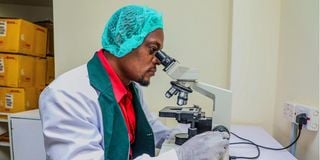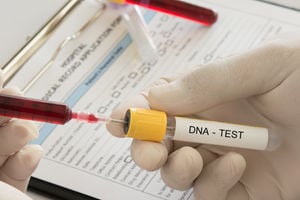
Angus Nassir, the chief Scientist at the Bioinformatics Institute of Kenya in this photo taken on October 15, 2024.
In a quiet laboratory in Nairobi, Angus Nassir, a biomedical scientist and bioinformatician, oversees perhaps one of Kenya’s busiest DNA testing clinics. As the chief scientist at Bioinformatics Institute, when Lifestyle drops by, he reveals he handles about 125 paternity test cases every month.
This was not the case eight years ago.
“When we opened, we had zero clients. Sometimes we could get one client an entire month,” he says.
Then with time, their numbers grew progressively to three, five, 10, and so on.
A majority of their customers are men carrying the weight of uncertainty about whether they are truly the biological fathers of their children.
“Out of every 10 paternity tests that we do, three or four turn out to be negative. And this remains constant year after year,” says Mr Nassir.
Once a time-consuming and complicated process, DNA testing has become accessible. The availability of faster technologies and specialists has also strengthened Kenyans’ drive to know their relatives or if they sired the children who call them daddy.
Another clinic that has seen a steady increase in demand for such tests is the DNA Solution Center in Nairobi. Esther Mbula, the director, says they conduct about seven paternity tests each week.
“In a month, we roughly do 30 paternity tests,” Ms Mbula says, “In most cases, the men come by themselves.”
When the center started over 12 years ago, they would get about five to eight clients, according to the director. This trend is reshaping conversations about responsibility, trust, and the definition of fatherhood in a society where traditional values often clash with modern realities.
According to the Kenya DNA report released earlier this year by the Bioinformatics Institute of Kenya (KIBS) after analysing 6,169 DNA profiles from relationship testing samples, out of every 30 men who take paternity tests, 10 are raising children who are not biologically theirs. The study showed that while 64 percent of tests confirmed paternity, a significant 32 percent resulted in exclusion – meaning the men tested were not biologically related to the children they believed to be theirs.
The report also uncovered several notable trends in DNA testing patterns across Kenya. Paternity tests dominated, accounting for 94 percent of all DNA tests conducted, with siblingship tests a distant second at two percent.
Interestingly, 93 percent of all tests were performed discreetly for personal knowledge rather than legal purposes, highlighting the private nature of these inquiries. The study also revealed a gender disparity in testing: maternity tests accounted for less than one percent of all DNA tests, and notably, all women who suspected their babies had been switched at birth were proven wrong.
Growing demand for paternity, ancestry, and legal DNA tests has spurred investment in private labs and hospitals offering these services. Mr Nassir says there are about 10 laboratories offering DNA currently, from two a few years ago. DNA testing in Kenya has expanded beyond government facilities like Kenyatta National Hospital and Kenya Medical Research Institute (Kemri).
As the facilities increase, so does the number of specialists. Mr Nassir, who holds a bioinformatics postgraduate degree from Jomo Kenyatta University of Agriculture and Technology, says he is part of about 2,000 bioinformaticians in Kenya with less than 200 practising.
Expensive licenses
However, setting up a DNA testing business is not cheap. Licenses and equipment are the most expensive.
“To meet the Level F and above requirements of the Kenya Medical Laboratory Technicians and Technologists Board, we had to make substantial investments. The lab license alone for a Level F lab costs Sh450,000. Additional licenses were required, including standard City Council permits and about Sh250,000 for the National Commission for Science, Technology, and Innovation (NACOSTI) license,” Dr Nassir says.
For equipment, an investor has to acquire a wide range of specialised tools, including a biosafety cabinet, DNA quantification instrument (Qubit), genetic analyser machine, and standard molecular biology equipment such as pipettes, -20°C freezers, among others.
Five to Eight days
What is also driving the demand is the turnaround time and accuracy of the results unlike before. Benedict Mwela, a molecular biotechnologist at Kibs Institute says; “Currently, it takes around seven to 18 days to have the results for paternity and maternity tests. For more complex cases like grandparent testing, it can take two to three weeks. But with good samples, we can sometimes deliver results in as little as five to eight days.”
The types of DNA tests available have also become diverse, catering to various scenarios. The standard paternity test involves sampling both the alleged father and the child. However, when the alleged father is unavailable, alternative options exist.
“We can determine paternity of a child using samples from the paternal grandmother,” Mr Nassir says, “This is based on the fact that grandchildren will always carry 25 percent of the DNA of their grandparents.”
Other options include avuncular tests (using samples from paternal uncles or aunts who share 25 percent of their DNA with nieces and nephews), siblingship tests, and Y chromosome tests for male children. “The Y chromosome test is only applicable to male children because the Y chromosome is passed across the patrilineal lineage,” the biomedical scientist says.
The standard test costs Sh30,000, a price that many seem willing to pay for peace of mind. The process is surprisingly simple: most tests use mouth swabs, which Mr Nassir describes as “non-invasive, painless, and easy to collect. You just put the swab in the mouth and rub the inner lining, then put it in a sterile envelope.”
But Ms Mbula, whose clinic charges Sh26,000 for one parent and a child with an additional Sh3,000 for each extra child, says the cost of the tests is still inhibitive.
“Many people want to know [if they sired the child], but they find it a bit expensive,” she says.
The experts in Kenya have also widened the sample list.
Mr Nassir says they now accept non-standard samples such as hair (with roots), toothbrushes, teeth, used drinking straws, and even bottles or cups someone has used. For deceased individuals, they can extract DNA from nails, bones (typically femur), or teeth.
Privacy and ethical considerations have also calmed clients' nerves.
“Usually, the report will be encrypted with a password only known to you. The data in the database is also encrypted and anonymised. If by any chance someone hacks the database, they will not be able to connect that data to you,” Mr Nassir says.
Also read: My wife is a serial cheater. Can she change?
Shattered family
James Wanyonyi, (not his real name), is among those who say has benefitted from the DNA clinics. After 18 years of marriage and raising three teenagers he believed were his own, a DNA test revealed a truth that shook him to his core: he is not their biological father.
“It feels like dying whilst still breathing,” the 47-year-old businessman says.
James’s story begins like many others – a young man in his 20s, ambitious and in love. He met his wife, Margaret*, at university in 1999. They married in 2005, after he had secured a job as a junior accountant, teaching at a local secondary school. Their first child, Joy*, arrived a year later.
The first cracks appeared in his marriage three years ago. Margaret became distant, spent more time in church, and was often “working late.” James, consumed by his role as provider, initially dismissed the signs. Then came the request for divorce in January this year.
It was not until James’s lawyer suggested a DNA test as part of the divorce proceedings that his world truly fell apart. The results arrived in a sterile, white envelope two weeks later.
All the three children were not his. James moved out of the family home, but the separation from the children has been excruciating. James says he is waiting for his first-born daughter to finish the Kenya Certificate of Secondary Education exams to tell them that he is not their father.
The legal implications of the DNA results are complex. Under Kenyan law, James is still considered the children’s legal father, having been married to their mother and listed on their birth certificates.
In his darkest moments, James has found an unexpected lifeline – a support group for men in similar situations. They meet monthly in a church hall in the Westlands area of Nairobi, sharing stories and silence in equal measure.
Through the group, James connected with a therapist who specialises in paternity fraud cases. “She’s helping me understand that my love for the children isn’t diminished by DNA,” he says. “She says Biology makes fathers, but love makes dads. I’m trying to hold onto that.”
“These children are innocent,” he says. “They didn’t ask for any of this. Whatever happens with Margaret, whatever the DNA says, I’m the only father they’ve ever known. I’ve been there for every skinned knee, every school play, every triumph and tragedy of their lives. DNA can’t erase that.”
“The worst part is the uncertainty; will they hate me for not being their ‘real’ father? Will they hate their mother for the lie? Will they want a relationship with their biological father? There are so many questions and no good answers,” he says.
Psychologist’s take
While the scientific process may be straightforward, the human impact is profound and complex. This is where Michael Mwangi enters the picture. With a background in medicine and counselling psychology, Mr Mwangi has spent the last three years working with men grappling with questions of paternity.
“We have to prepare them for any possible outcome through pre-counseling, intra-counseling during the processing, and post-counseling as we relay the results,” Mr Mwangi says.
One of Mr Mwangi’s key strategies is what he calls “catharsis” – giving men the space to process their emotions. “Some of them can break down explaining the betrayal. They never fathomed that such a matter could happen,” he says.
As a fitness enthusiast, he often recommends exercise to help process the emotions. “I prescribe sessions for them where they can use exercises to push out anger and heal,” he says. He also connects clients with support groups of men who have gone through similar experiences, helping them understand they’re not alone.
Mr Mwangi offers a scientific perspective on why paternity fraud occurs. He explains that nature influences women to seek what they perceive as “alpha” genes.
“Historically, women get babies with men they perceive as alpha, the strong genes,” Mr Mwangi explains. He argues that in modern society, where women may have multiple partners before marriage, this can lead to complicated situations. A woman might settle down with a “provider” while still being drawn to men she perceives as having stronger genes.
“If she doesn’t perceive the man she has married as having strong genes, there’s a high likelihood that she will conceive for the man she perceives as having high testosterone.”
When a test comes back negative, the path forward is not always clear. Mr Mwangi describes how men typically respond: “Most men continue with normalcy for a couple of weeks or months. Then I guide them to structure a way forward.”
Some men choose to maintain their relationship with the child, perhaps continuing to pay school fees or treating them as adopted children. Others opt for immediate detachment. Mr Mwangi’s role is to help them evaluate all possibilities and guide them in decision-making.
While most cases do not end up in court, Mr Mwangi is prepared to guide clients through legal processes when necessary. “If there’s a push and pull, if the woman doesn’t accept the non-legal results, we can do a legal test,” he says. However, he notes that this is rare: “Most of the time we don’t go there because DNA will not change.”
For men grappling with doubts, Mr Mwangi is clear: “Paternity test needs to be mandatory,” he says. “We all want what we call genetic legacy.”
He argues that knowing the truth, however painful, is better than living in uncertainty. “I think it’s masculine to confront your challenges and get the truth,” he says. “If you’re providing, if you’re protecting children who are not yours, you think you have a genetic legacy and you don’t.”
Free DNAs
Anne Nyakarura, who coordinates a donor-funded initiative and does the Genesis DNA show on YouTube providing free DNA tests, has witnessed the impact of making these tests accessible at the DNA Testing services clinic in Hurlingham, Nairobi. It has been operational for over two decades. Since May, her programme has facilitated tests for 12 men. Of these, four received negative results – learning they were not the biological fathers of children they had been raising.

Anne Nyakarura, coordinates a donor-funded initiative and does the Genesis DNA show on YouTube providing free DNA tests based in Nairobi.
“They were all very shocked,” Ms Nyakarura says. “Though one was happy because he already had another family and didn’t want this other child to be his responsibility, most were just in disbelief.”
Ms Nyakarura’s initiative is to try to address these broader implications. “We’re looking for counsellors, especially volunteer counsellors,” she says. “Most of our clients need counselling. Some are young and confused about their responsibilities. Others are in relationships and don’t know how to handle the results. We are also looking for non-governmental organisations and donors who are passionate about ending gender-based violence and child negligence/abandonment that have been brought about by paternity doubt.”
But as paternity testing becomes almost a norm, it forces us to question what truly makes a father—biology or bonds forged through years of love and care?
“People say we’re breaking families,” Ms Mbula says, “but if a married man finds out a child isn’t his, many blame the test for breaking the family. The truth was already there – we just uncovered it.”





